Hostel Experience: What to Expect When Staying in a Hostel for the First Time
Disclaimer: Links on this page may be affiliate links. If you make a purchase after clicking a link, I may receive a small compensation to help power my site at no cost to you.
Staying in a hostel for the first time is an interesting experience, to say the least.
If you’ve never been outside your home country or never traveled alone, you may be terrified at the idea of sleeping in a room with strangers. Then again, maybe you’re super excited!
When I first started traveling solo, I looked forward to staying in hostels. I was in my early 20’s and felt such a sense of accomplishment whenever I planned a trip, booked my own accommodation, and made it to all the tourist hot spots with nothing more than a paper map.
But, nervous or excited, you’ll quickly discover when you try a new experience, it’s almost always worth it.
Here’s a list of what to expect for first-timers staying at a hostel.
What to Expect When Staying at a Hostel for the First Time
If you’re a new traveler (solo or not), you probably have a lot of questions, doubts, and even concerns about what hostel life will be like. Read on for what to expect with the hostel experience.
1. Locating and checking-in to your hostel
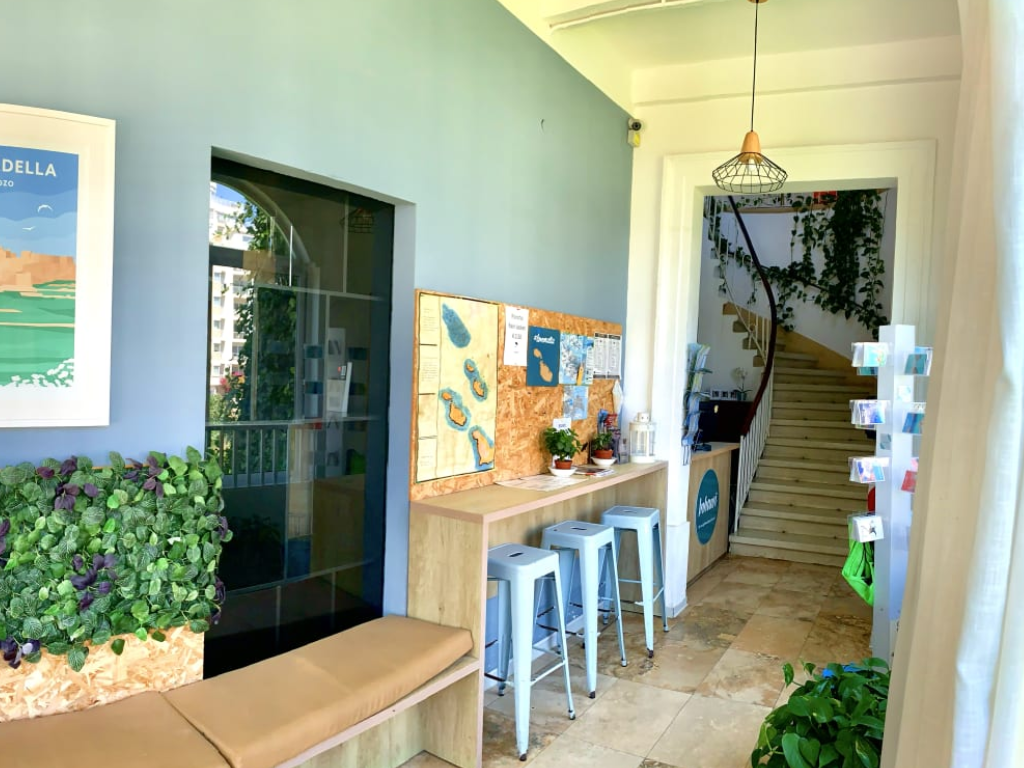
Upon arrival at your hostel, the first thing you may notice is that it is hard to get in.
That’s because some hostels are located in older buildings where the entrance may be on a side door, or the lobby may be on a higher floor.
Moreover, hostels tend to be locked, though not always during the day. Although this is a minor annoyance, it’s for the safety of everyone who’s staying inside and prevents theft, which does happen inside hostels sometimes (Read more on hostel safety.).
Regardless, don’t panic. Simply locate your hostel, press the buzzer, and the staff will let you in!
Once you’ve made it to the front desk, you might be surprised to find out that the staff is international. When I first started staying in hostels in Spain, I was excited to use my second language: Spanish. Instead, I quickly learned that many hostels employ staff from all over the world.
Next, have your booking number, passport, and payment method ready. Some hostels will hold your passport during your stay. If this makes you—rightfully—hesitant, see if they’ll accept a color, laminated copy. (Check out our packing guide for Europe to see what else you need.)
By the way, some hostels are still cash-only. Be sure to look into this before you arrive, so that you can plan accordingly.
Traveler Tip: You can get cash at ATMs. Although ATM fees and exchange rates are sometimes more expensive at airports, we usually take some cash out immediately upon arrival to have on hand. You just never know when you might need it
2. Choosing your bed takes skill
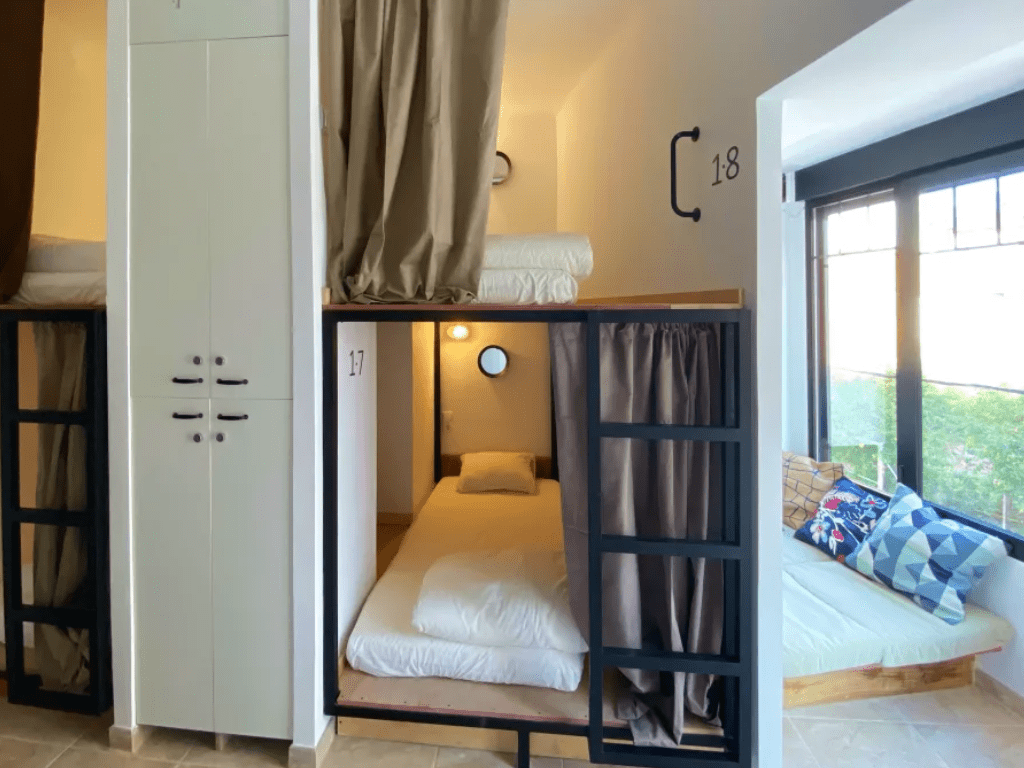
Some hostels allow you to choose any bed you prefer once you get into the room. Unquestionably, this is when it’s nice to be the first to arrive!
On the other hand, some hostels will assign you a bed number. When you get to the room, match the number they gave you (often on your room and/or locker key) with the corresponding bed. (Check out the photo above of the Hostal Número Trece in Alicante to see an example of how beds are numbered.)
Honestly, I’m always bummed when the beds are assigned.
I’d much prefer to see the room and then decide which bed to take depending on my preferences: away from the door or bathroom, for example.
Even if the hostels assigns beds, you may get to the room and see that your bed is taken. Despite a little confusion, it’s not a big deal. Perhaps that person didn’t understand that the beds are numbered, wanted to move to be closer to a friend, or didn’t want to catch the draft.
Just choose another bed. As a courtesy, let reception know which bed you’ve chosen so they can plan for the next visitor.
If you do get to choose a bed, think about what’s important to you. Is it a lower bunk or a bed next to the wall, perhaps?
Getting excited for the hostel experience, yet?
Insider Tip: To prevent getting a bad bunk assignment, in your opinion, note your bunk preferences while booking on a site like Hostelworld. Then, kindly mention the preference again at check-in. There’s no guarantee the property will honor your request, but you can try.
3. Not all hostels have lockers
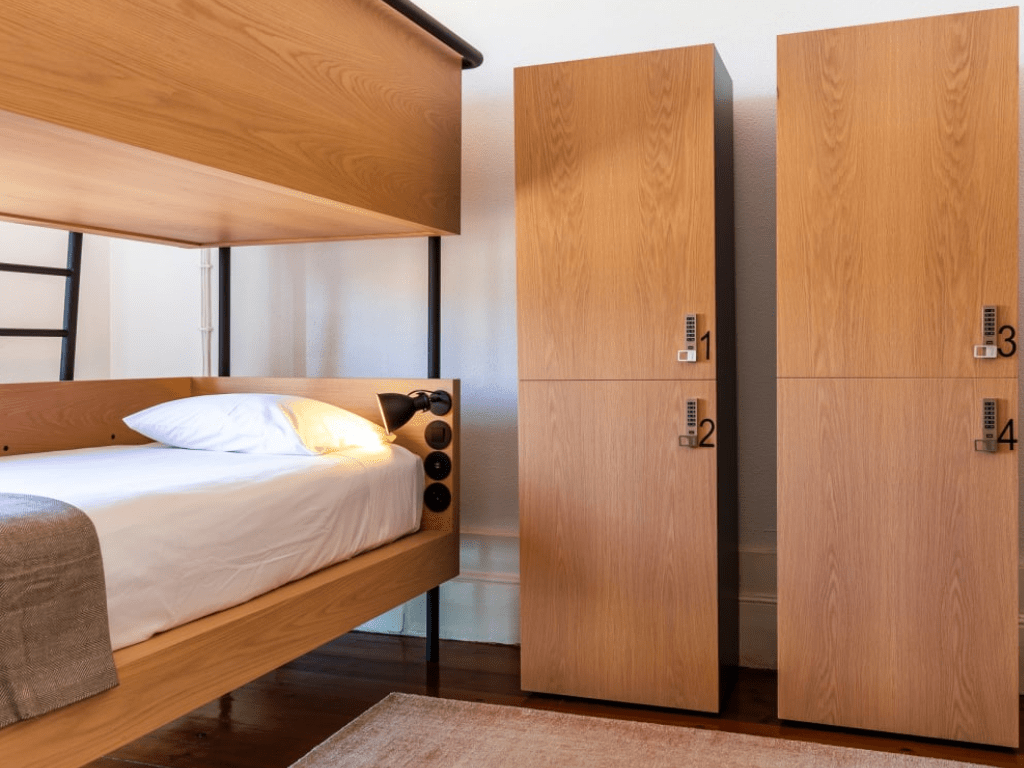
One of the biggest safety risks in hostels is petty theft. Valuable items like passports and cash are at particular risk. (In light of this fact, check out how to keep yourself safe in hostels.)
Surely, it’s nice when hostels have lockers where you can store your things, but not all of them do. And the ones that do may or may not have locks included.
In any case, it’s best to come prepared with your own travel lock. This way, you can lock the locker and/or your luggage to prevent petty theft. (See more hostel essentials.)
We love this cable lock since the cord is super versatile. In addition to locking your locker or luggage, you can lock your bag to something. For example, attach it a chair leg while sleeping!
If you forgot to bring a lock, check the front desk to see if they have any for sale or rent.
4. Staying in a mixed dorm can be awkward

Unless you specify you’d like to book a female dormitory or male-only dorm, dorms will default to mixed gender dorms.
To those that have a significant other or even siblings of the opposite sex, finding yourself in a mixed dorm may be no big thing.
But for others, it can be incredibly awkward — at any age or stage of life.
However you feel, here are some ideas to make things more comfortable when staying in mixed dorms:
- Hang a sarong or towel to create privacy or simply a barrier. (I’m not the biggest fan of waking up and seeing a stranger in the next bed facing me!)
- Change in the bathroom, and don’t leave bras and underwear hanging around the room.
- Wear modest pajamas. Honestly, even if you are staying in a same-gender room, you may want to err on the side of caution since different cultures have varying perceptions of modesty.
Read more in our article, Should I stay in a mixed dorm?
5. There may be people living at the hostel

Something very disconcerting on my first solo trip to London was the amount of people living at the hostel.
I quickly learned why.
Hostels often employ staff in exchange for room and board. If this is something you’d like to do check out Worldpackers’ job board.
Additionally, some travelers stay long-term or are digital nomads. Therefore, they really are living out of a suitcase in the hostel.
Regardless, when you get stuck in a room with people that have moved in, is the worst. In several hostel experiences, I’ve found that long-term guests tend to trash the rooms out.
To avoid this, check the reviews before you book on a site like Hostelworld. You can also request that reception move you to a different room.
6. Hostel breakfast is likely going to be minimal

If you’ve opted for a hostel with breakfast, don’t get too excited.
In our experience, hostel breakfasts are usually minimal, especially at the cheaper backpackers’ hostels in Europe.
You can expect:
- Toast and jam
- Boxed milk
- Corn flakes (if you’re lucky)
- Instant coffee
If you’re on a budget or in a hurry, by all means, have a piece of toast! Coupled with some yogurt, fruits, and nuts from the local grocery store, you’ll be all set.
All in all, If breakfast is really important to you, go out for breakfast! Or, pay close attention to the reviews so you can find a place with a healthy, filling breakfast.
7. Travelers of all ages stay in hostels

Although commonly be referred to as youth hostels (at least by Americans), travelers of all ages are invited to stay in dorms — and they do.
Lately, it’s becoming more common for the over 50 crowd to stay in hostels. Why not? Hostels are great for people of all ages who love to travel, save money, and live communally.
Families also stay in hostels, often in rooms advertised as triples, quads, or family rooms. We love to see families traveling together and making memories that last a lifetime, wherever they choose to stay!
Thus, don’t be surprised when you see hostel-goers of all ages. Embrace the hostel life, and strike up a conversation about each others’ perspective on life, travel, and what it’s like to stay in a hostel. You never know what you might learn or what connections you might make.
8. English is typically the common language spoken at hostels

One of the neatest things about staying in hostels is interacting with travelers from all over the world. To describe, one moment you’ve never met someone from Slovenia. The next, she’s your bunkmate.
Since there are lots of international people (both staff and guests), English is typically the language spoken at hostels.
If you’re like me and love to learn other languages, this is particularly disappointing.
That said, don’t let it get you down. Make friends in English, and the two of you can explore Athens together. Don’t forget to brush up on your Greek!
9. Kitchen and other amenities
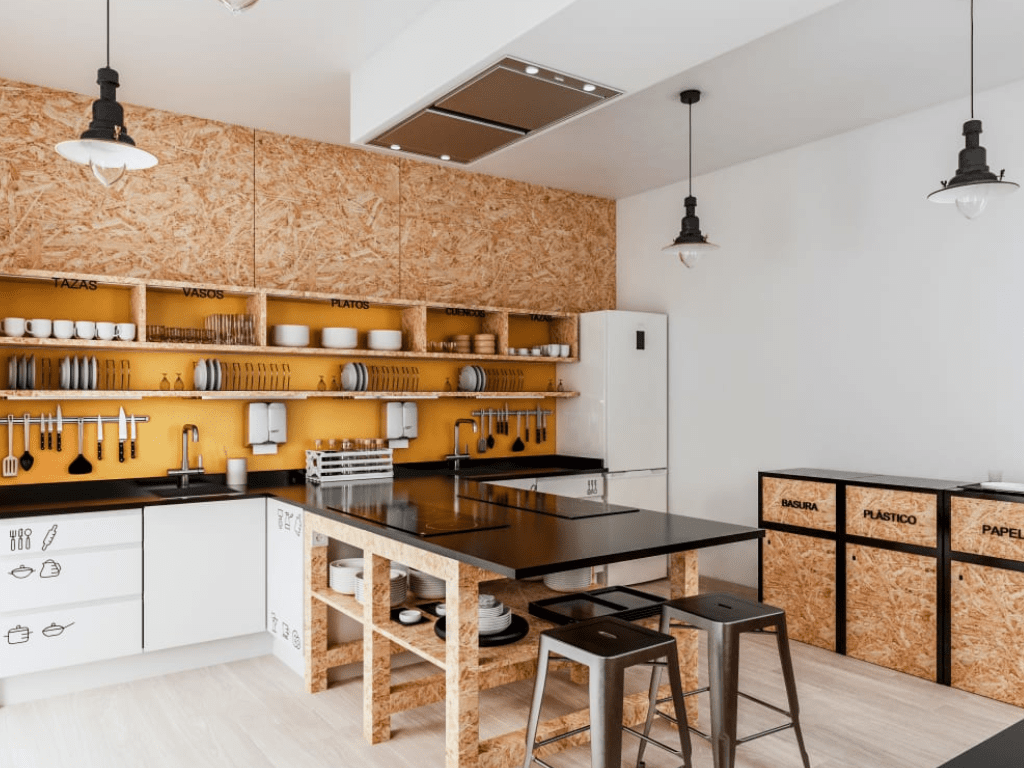
One of the nice features of hostels is the amenities. These might include:
- Communal kitchen
- Living room or shared lounge
- Laundry room
- Patio or outdoor space
- Café or bar
If you want to save money and cook for yourself, book a hostel with a shared kitchen.
There, you’ll find everything you need to prepare a simple meal: bowls, spatulas, pots and pans, etc. Basic ingredients will often be available such as olive oil and salt and pepper.
Inside the fridge, there are usually containers and bags with people’s names on them. (Simple hostel etiquette tells us not to use food that isn’t ours.)
Whatever the case, always read the rules, which hostels post in the host language as well as English.
Rules typically include fridge clean out dates, communal items, where to store clean items, kitchen opening/closing hours, etc.
There are actually lots of hostel styles. Whatever is important to your hostel experience, look for it in the description when booking.
10. Not everyone will be respectful
Hostels run on mutual respect and community. A good hostel will make that clear in their rules, property, and by the way they treat guests.
Likewise, guests will almost always respect other guests and their belongings.
But not always.
Let’s face it: some people are just rude. If they need to do laundry, they’ll just take your laundry out of the washing machine, for example.
This type of behavior is not cool in any way shape or form, and we know you won’t act like this.
Notwithstanding, there really are just cultural differences and misunderstandings at times.
For example: appropriate amount of time to spend in the shower, volume at which people speak, and the time people go to bed or get up can all vary based on culture.
In this case, take these as a learning lesson for life and for how to be a better hostel guest.
See more on our tips for staying in hostels.
11. Shared spaces are a part of the hostel experience
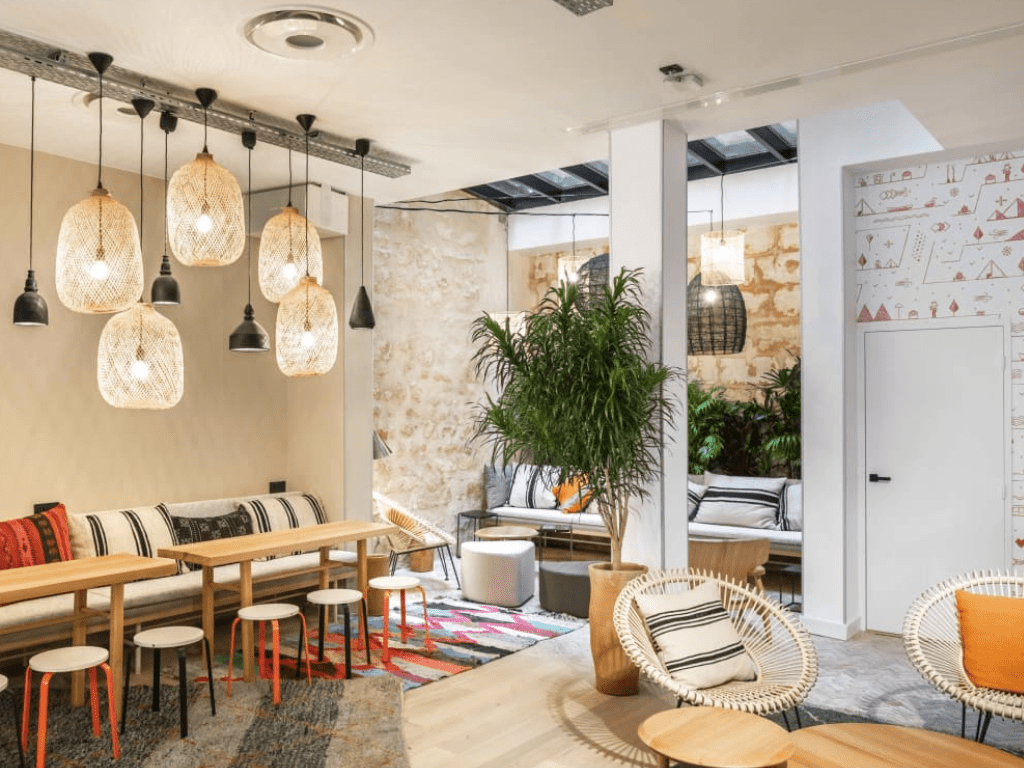
If you need your own space, the hostel experience may not be for you.
Immediately, you’ll notice space is really tight.
In other words, lobbies are tiny, staircases are narrow, and some rooms have entirely too many beds!
At the property, you will usually share a bathrooms. Depending on the property, you will find like-gender or mixed restrooms. Sometimes they are in hallways, on entirely different floors, or ensuite.
Getting dressed in the shower stall is aggravating. Likewise, getting ready (hair, ironing, or makeup, for example) can also be an issue when you have no mirror or outlets nearby.
In any case, you can’t just spread out like at home. That’s why it’s important to pack things like lightweight, wrinkle-free items and let your hair air dry (if you can!)
To reiterate, you’ll be in shared, and often tight, spaces.
As an illustration, sometimes there are no seats left at the breakfast table. Other times, all 14 beds are booked in the room, and you’re smack dab in the middle of all those eyes!
And as for outlets, there never seem to be enough. Luckily, travel plug adaptors are great for charging multiple items at once as well as sharing with other hostel-goers.
Have you come to realize you really are just renting a bed? Well, the bed and the hostel experience, of course!
12. Bed bugs are a thing
Bed bugs are a reality no matter where you stay. Albeit being disgusting, they aren’t an indication of bad hygiene or lack of cleaning.
In fact, they can be found in five-star hotels just as they’re found in hostels.
When you get to your room, check for signs of bed bugs before you do anything else.
If you spot any signs, ask to be moved to another room.
Don’t feel bad, hostels want to know if there are bed bugs so they can fix the problem!
Besides, it’s better to be safe than itchy!
Furthermore, you might be requested to put your luggage inside a black trash bag. In France, this is fairly common. There’s no need to panic. The hostels are just trying to prevent bed bugs.
But wait, don’t let the threat of bed bugs scare you off from the hostel experience. In all likelihood, you’re going to be just fine (In over 30 countries I’ve only encountered them on one trip). Do, however, consider treating ALL your items with Permethrin spray before travel.
13. You can’t control the heat or a/c
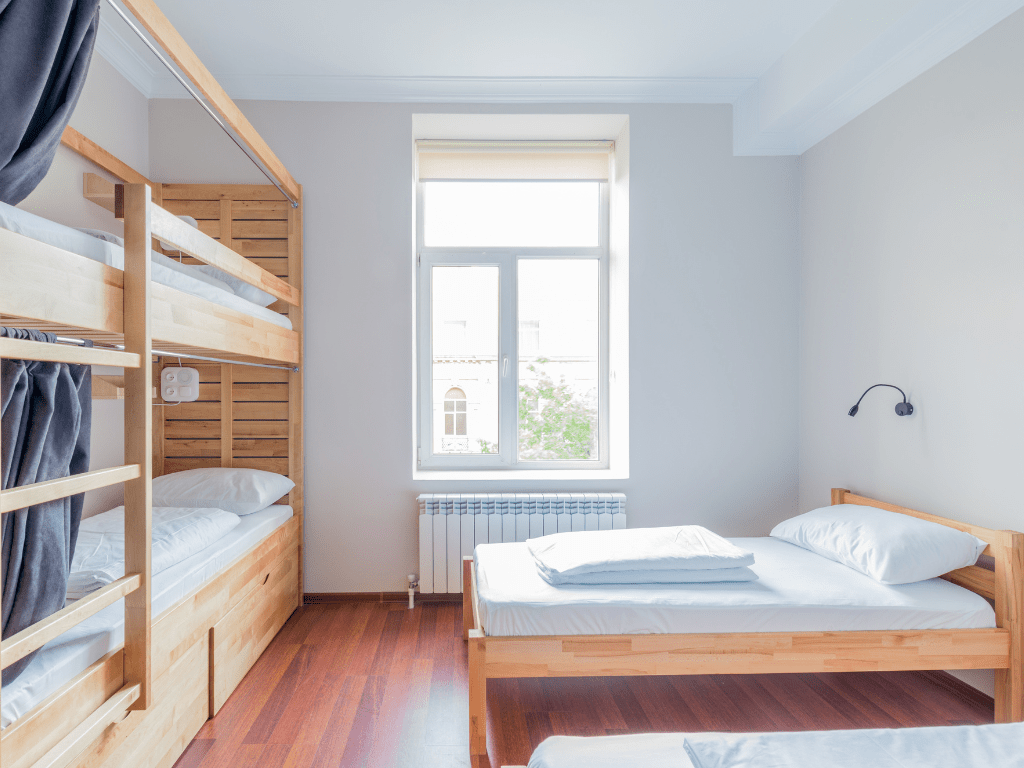
Realize you have virtually no control over the thermostat.
In the winter, you might need to bundle up. In the summer, you might wake up in a pool of sweat.
Why, you wonder?
On the one hand, many hostel buildings are older, historical even. Your building might not have central air or heating, for instance.
On the other hand, there are cultural differences over what’s considered an ideal temperature.
French people believe that air conditioning will make them sick, for instance.
Don’t be surprised if you battle over the window, fans, or any other factors with a dial! We’ve definitely encountered people who have strong opinions about those!
14. You might need your own sheets
Almost every hostel I’ve stayed in has included sheets and pillows at no additional costs.
In the winter, they usually provide blankets. Even so, just like the top covers at hotels, the blankets aren’t always washed after every guest.
If you’re unsure or easily grossed out, bring a lightweight sleeping bag liner that’s comfy and easy to pack.
It’s time to book your first hostel experience!
We had fun taking you through the first time hostel experience in this article. If you’re a new traveler (solo or not), we hope this answers any questions, doubts, and concerns you have about what hostel life will be like.
Whatever you decide to stay, we hope this helps you to feel prepared for your trip.
Now, it’s time to experience hostel life! Start by searching Hostelworld, the world’s largest inventory of hostels (and a site we’ve used many times). Do a simple search, read the reviews, and book a stay. Before you know it, you’ll be experiencing all your hostel — and the world — has to offer!
Staying in a hostel? You may also like
Want more info the hostel experience? Check out some of our top articles:
- Hostel Essentials: Hostel Packing List for Staying in a Hostel
- 12 Types of Hostels: Find Your Ideal Hostel
- Are Hostels Safe: 10 Practical Tips for Hostel Safety
Click image to Pin it to Pinterest!

